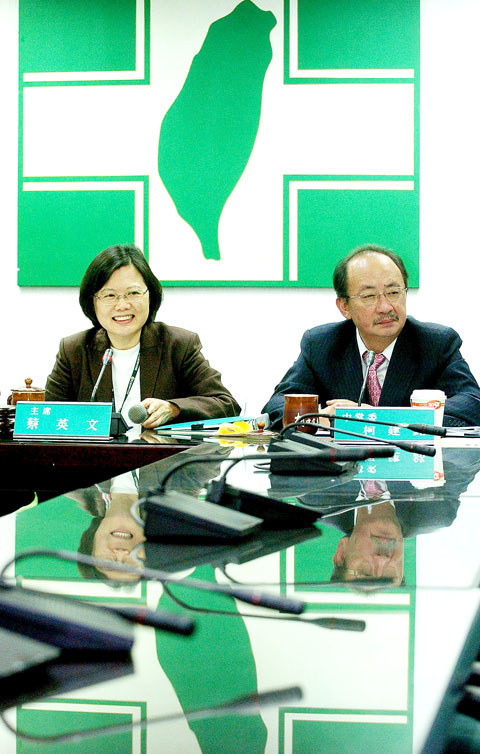The Democratic Progressive Party (DPP) next Saturday will hold a demonstration to protest against President Ma Ying-jeou’s (馬英九) government, and anyone who supports that position is welcome to take part, whether they are for or against former president Chen Shui-bian (陳水扁), the party announced yesterday.
The party yesterday hammered out plans for the event, which will be held in Taipei under the title “Anti-China, Anti-Ma, protect Taiwan.”
The question of the former president, who is under investigation for alleged money laundering, complicates the issue, however, as some party members demanded yesterday that the party not allow Chen to take part.

PHOTO: WANG MIN-WEI, TAIPEI TIMES
As part of a debate within the party on whether it should support or distance itself from Chen, some DPP Central Standing Committee members argued yesterday that Chen’s participation at the rally would defeat the point of the demonstration.
Former DPP legislator and committee member Tuan Yi-kang (段宜康) told the committee yesterday that the party should bar Chen from participating in the demonstration to avoid “having an even more [negative] impact on the party.”
He called on the party to clarify its stance on Chen, saying it should clearly declare that it does not support Chen’s alleged wiring money abroad and political manipulation. Tuan was referring to Chen’s claim that his wife wired the leftover political contributions from his two mayoral and two presidential bids between 1993 and 2004 overseas without his knowledge.
Tuan did not elaborate on what he meant by “Chen’s political manipulation.”
As for Chen’s judicial rights, the party should give him full support, Tuan said.
DPP Legislator Chai Trong-rong (蔡同榮), another member of the committee, however, said the party should respect Chen’s decision on whether he wished to join the rally.
“As a politician who has spent his life promoting Taiwan’s democracy, the party should allow Chen to join the rally,” Chai said. “The party may fall into chaos if it stops Chen from doing so.”
DPP Legislator Chang Hua-kuan (張花冠) and Tainan Mayor Hsu Tain-tsair (許添財), both members of the Central Standing Committee, also supported Chen’s participation in the rally, while Kaohsiung County Commissioner Yang Chiu-hsing (楊秋興) opposed the idea.
In the end, DPP Chairwoman Tsai Ing-wen (蔡英文) ruled that “anyone who supports the goals of the rally is welcome to join the rally.”
“Party members should not define one another in terms of Chen’s judicial investigation and the party should not be split by the matter,” Tsai said.
In Kaohsiung yesterday at a separate setting, the former president said that he would “definitely attend the Oct. 25 demonstration.”

Nvidia Corp yesterday unveiled its new high-speed interconnect technology, NVLink Fusion, with Taiwanese application-specific IC (ASIC) designers Alchip Technologies Ltd (世芯) and MediaTek Inc (聯發科) among the first to adopt the technology to help build semi-custom artificial intelligence (AI) infrastructure for hyperscalers. Nvidia has opened its technology to outside users, as hyperscalers and cloud service providers are building their own cost-effective AI chips, or accelerators, used in AI servers by leveraging ASIC firms’ designing capabilities to reduce their dependence on Nvidia. Previously, NVLink technology was only available for Nvidia’s own AI platform. “NVLink Fusion opens Nvidia’s AI platform and rich ecosystem for

WARNING: From Jan. 1 last year to the end of last month, 89 Taiwanese have gone missing or been detained in China, the MAC said, urging people to carefully consider travel to China Lax enforcement had made virtually moot regulations banning civil servants from making unauthorized visits to China, the Control Yuan said yesterday. Several agencies allowed personnel to travel to China after they submitted explanations for the trip written using artificial intelligence or provided no reason at all, the Control Yuan said in a statement, following an investigation headed by Control Yuan member Lin Wen-cheng (林文程). The probe identified 318 civil servants who traveled to China without permission in the past 10 years, but the true number could be close to 1,000, the Control Yuan said. The public employees investigated were not engaged in national

ALL TOGETHER: Only by including Taiwan can the WHA fully exemplify its commitment to ‘One World for Health,’ the representative offices of eight nations in Taiwan said The representative offices in Taiwan of eight nations yesterday issued a joint statement reiterating their support for Taiwan’s meaningful engagement with the WHO and for Taipei’s participation as an observer at the World Health Assembly (WHA). The joint statement came as Taiwan has not received an invitation to this year’s WHA, which started yesterday and runs until Tuesday next week. This year’s meeting of the decisionmaking body of the WHO in Geneva, Switzerland, would be the ninth consecutive year Taiwan has been excluded. The eight offices, which reaffirmed their support for Taiwan, are the British Office Taipei, the Australian Office Taipei, the

CAUSE AND EFFECT: China’s policies prompted the US to increase its presence in the Indo-Pacific, and Beijing should consider if this outcome is in its best interests, Lai said China has been escalating its military and political pressure on Taiwan for many years, but should reflect on this strategy and think about what is really in its best interest, President William Lai (賴清德) said. Lai made the remark in a YouTube interview with Mindi World News that was broadcast on Saturday, ahead of the first anniversary of his presidential inauguration tomorrow. The US has clearly stated that China is its biggest challenge and threat, with US President Donald Trump and US Secretary of Defense Pete Hegseth repeatedly saying that the US should increase its forces in the Indo-Pacific region